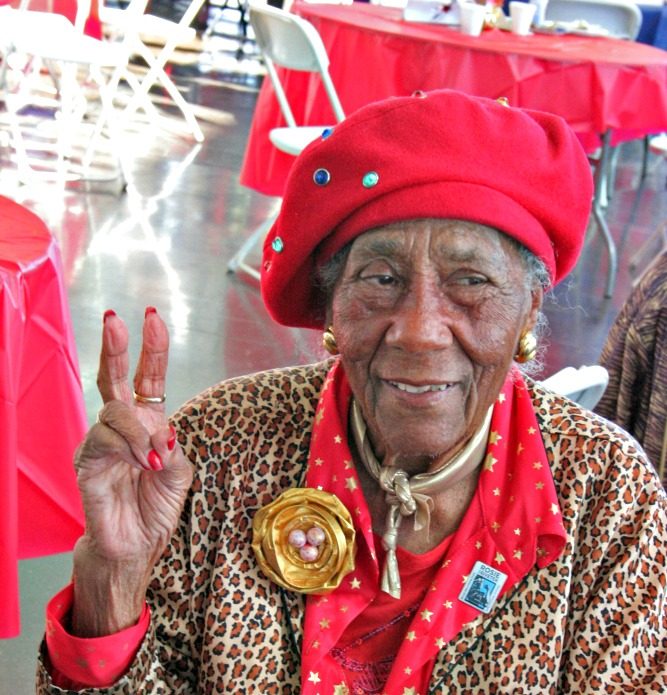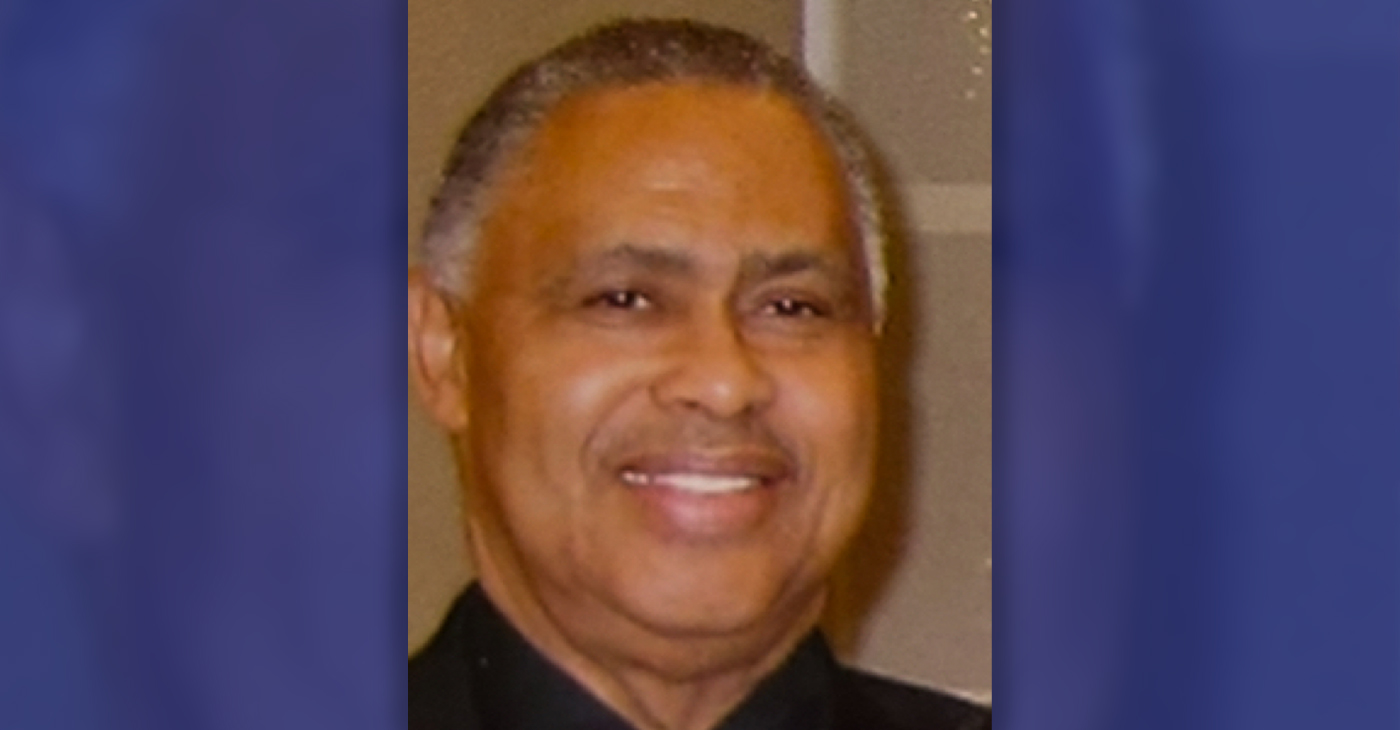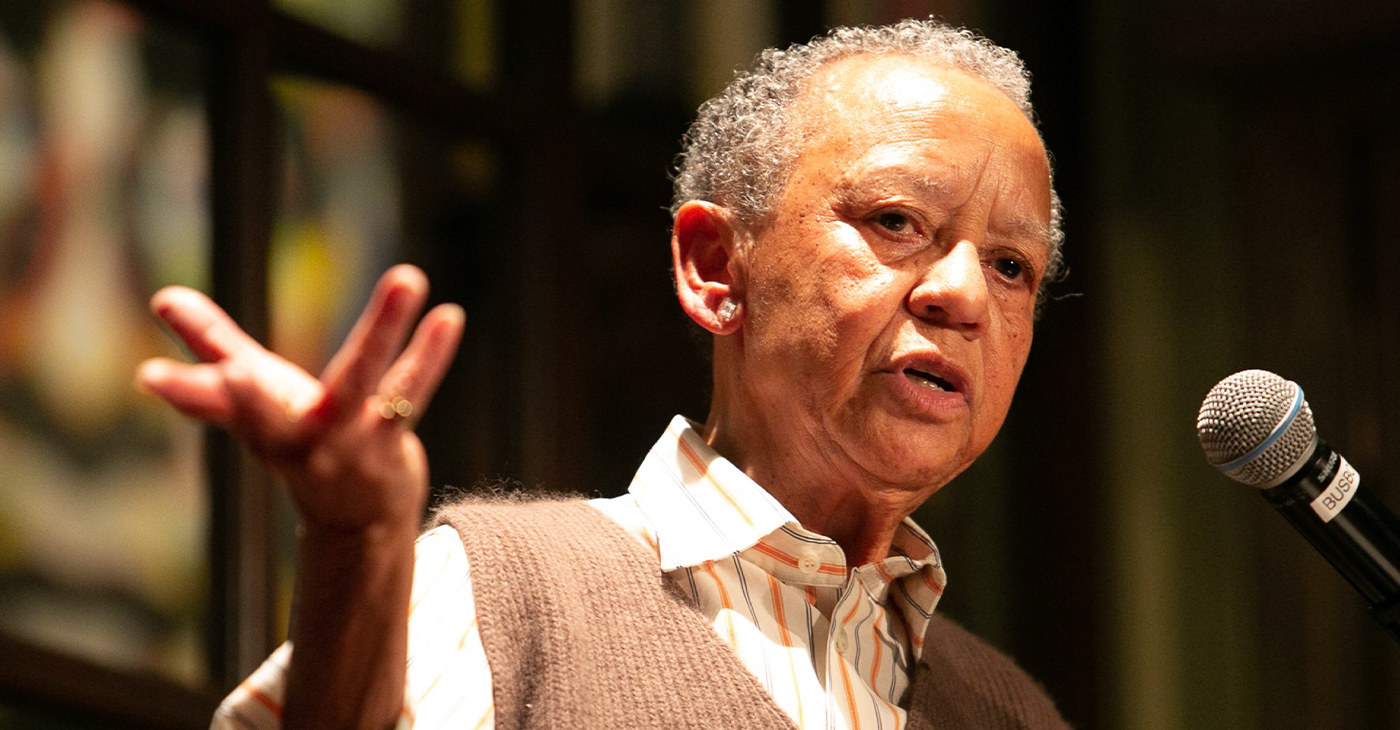Obituary
Mary“Peace” Head, “Mayor of Parchester Village,” 94

By Nadia Perez
Richmond resident Mary“Peace” Head, “Mayor of Parchester Village and a Rosie the Riveter in World War II, died on April 13. She was 94.
Born in Shreveport, Louisiana on Jan. 31, 1923 to Johnny and Jessie Ross Starks, she was born in Louisiana, where she met her husband Leroy Head. She moved to California to join him after he was assigned to a post at Treasure Island with the Navy.
The couple made their home together in Parchester Village where she was lovingly referred to as “mayor” in recognition of her civic work and proven dedication to her community. Here they had their children Gloria, La-Wan Nel, Brenda and LeRoy.
During World War II, she worked in the Richmond Shipyards as one of the legendary Rosie the Riveters building Liberty ship. Her nickname “Peace” was attributed to her when she held a “Peace Prayer” before entering in 1943.
The couple had four children, daughters Gloria, La-Wan Nel, and Brenda and son LeRoy.
Along with her dedication to service and her honored post on the City of Richmond’s Commission on Aging, she became licensed in holistic medicine and reflexology, dance, and received her high school diploma from West Contra Costa Adult School at the age of 78 in 2007.
Bay Area
IN MEMORIAM: Harvey Knight, 82
You are invited to attend the funeral services on Friday, Dec. 27, at Evergreen Baptist Church, Bishop L. Lawrence Brandon, senior pastor, 408 W. MacArthur Blvd., Oakland, CA at 11 a.m. Rev. Dr. Jacqueline A. Thompson, pastor of Allen Temple Baptist Church will bring the eulogy.

Special to the Post
Harvey Knight, Jr., “Pops” to so many young men from Oakland, passed away at 82 on Dec. 5. Harvey was married to Brenda Knight, founder of Ladies In Red, for 51 years.
He was born on April 6, 1942, in Laurel, Mississippi.
After completing high school, Harvey moved to Oakland, California, to live with his father’s sister. He knew this would become his home. He loved the Bay Area for the sports it offered him as a basketball, baseball, and football fan.
He worked for UC Berkeley for over 43 years and part-time for the Oakland Coliseum for approximately 15 years as a security guard, where he could be close to his favorite pastime.
After establishing himself with jobs and his place to live, he knew something was missing. He found the love of his life, married her, and knew his life was complete.
Three sons were born to their union: Leonard, Harvey III, and Michael. He and his sons enjoyed the life of sports by going to the games and later supporting them in baseball at school and through Babe Ruth Baseball. His love of sports was passed on to his sons. All three played baseball while attending college.
Harvey was a soft-spoken man who provided life gems to many young boys playing baseball with his sons. Many of them would end up at the Knight family table for dinner or to listen to the man they all called ‘Pops.’
Harvey loved to travel and take in the history he experienced on his many trips with his wife, Brenda, and the organization she founded, Ladies In Red. Although Harvey did not like the color red, he enjoyed the travel provided throughout the United States. He often researched to provide his wife with information to assist her in planning the trips.
His favorite trip was to Selma, Alabama, where he learned so much about Selma’s involvement in the Civil Rights Movement.
In lieu of flowers, please consider a donation in the name of Harvey Knight, to Foot Soldiers Park in Selma, Alabama. Go online to: footsoldierspark.org or mail to: Foot Soldiers Park INC, 1018 Water Avenue, Selma. AL 36701.
He leaves to mourn his passing, his wife Brenda; sons; Leonard, Harvey III and Michael; eight grandchildren, two great-grandchildren and a host of relatives and friends.
You are invited to attend the funeral services on Friday, Dec. 27, at Evergreen Baptist Church, Bishop L. Lawrence Brandon, senior pastor, 408 W. MacArthur Blvd., Oakland, CA at 11 a.m. Rev. Dr. Jacqueline A. Thompson, pastor of Allen Temple Baptist Church will bring the eulogy.
Activism
IN MEMORIAM: Nikki Giovanni, Iconic Poet and Voice of the Black Arts Movement, Dies at 81
Nikki Giovanni rose to prominence during the 1960s as a fierce voice in the Black Arts Movement, alongside literary giants such as Amiri Baraka, Audre Lorde, Ntozake Shange, and Sonia Sanchez. Her early works, including “Black Feeling, Black Talk” (1968) and “Black Judgement” (1968), were steadfast in their militancy and pride. Her poetry grappled with the injustices faced by Black Americans, including the brutal murder of Emmett Till and the bombing of the 16th Street Baptist Church in Birmingham, which killed four Black girls.

By Stacy M. Brown, NNPA Newswire
Nikki Giovanni, the groundbreaking poet, author, and professor whose work embodied the spirit of the Black Arts Movement and beyond, died on Monday in Blacksburg, Virginia. She was 81. Her wife, Virginia C. Fowler, confirmed the cause was complications from lung cancer.
Born Yolande Cornelia Giovanni Jr. on June 7, 1943, in Knoxville, Tennessee, Giovanni spent her formative years in Cincinnati, Ohio, but returned to Knoxville every summer with her sister to visit their grandparents. These visits helped shape her sense of identity and belonging, themes that would become central to her work.
She graduated with honors in history from Fisk University, a historically Black college in Nashville and her grandfather’s alma mater. While at Fisk, Giovanni’s defiant spirit and intellect were evident. Expelled briefly due to issues with authority, she returned after a period of reflection and was readmitted with the help of a supportive Dean of Women. This early experience of rebellion and reconciliation laid the groundwork for her unapologetic approach to life and art.
A Voice of Rebellion and Resilience
Giovanni rose to prominence during the 1960s as a fierce voice in the Black Arts Movement alongside literary giants such as Amiri Baraka, Audre Lorde, Ntozake Shange, and Sonia Sanchez.
Her early works, including “Black Feeling, Black Talk” (1968) and “Black Judgement” (1968), were steadfast in their militancy and pride. Her poetry grappled with the injustices faced by Black Americans, including the brutal murder of Emmett Till and the bombing of the 16th Street Baptist Church in Birmingham, which killed four Black girls.
At a time when mainstream publishers showed little interest in the work of a young Black woman writing what they labeled “militant” poetry, Giovanni took matters into her own hands. She self-published her work, founding a company to distribute her collections. “No one was much interested in a Black girl writing what was called ‘militant’ poetry,” she once wrote. “I thought of it as good poetry.”
Her boldness paid off. In 1972, at just 29 years old, she sold out Alice Tully Hall at Lincoln Center, reading her poetry to a crowd of more than 1,000 alongside the New York Community Choir.
The following year, for her 30th birthday, she filled the 3,000-seat Philharmonic Hall, where the choir joined her again, along with Melba Moore and Wilson Pickett. The audience erupted joyfully when she recited her now-iconic poem, “Ego-Tripping.” The piece, a celebration of Black female strength, begins with the lines:
“I was born in the congo
I walked to the fertile crescent and built
the sphinx…”
And concludes triumphantly:
“I am so perfect so divine so ethereal so surreal
I cannot be comprehended
except by my permission
I mean…I…can fly
Like a bird in the sky…”
A Prolific Career
In addition to her poetry, Giovanni wrote children’s books, essays, and a memoir, “Gemini: An Extended Autobiographical Statement on My First Twenty-Five Years of Being a Black Poet (1971).” She was known for her candid reflections on race, gender, and identity, blending the personal with the political in provocative and deeply human ways.
Giovanni’s interview with James Baldwin on the television program “Soul!” in 1971 remains a touchstone in American cultural history. Their two-hour conversation, filmed in London, explored the intersections of race, gender, and societal expectations. At one point, she posed a raw question about the cycle of violence affecting Black families: “What do you do about a man who is mistreated in the world and comes home and brutalizes his wife? Where does that leave his daughter?” Baldwin’s response: “Sweetheart. Our ancestors taught us how to do that.”
An Educator and Mentor
In 1987, Giovanni joined the faculty at Virginia Tech, where she became a University Distinguished Professor. She remained there for 35 years, influencing generations of students with her wit, wisdom, and unwavering commitment to truth.
Even in academia, her rebellious spirit shone through. Giovanni famously supported her student, Seung-Hui Cho, before he committed the tragic mass shooting at Virginia Tech in 2007. She had him removed from her class when she sensed his troubling nature.
Giovanni earned seven NAACP Image Awards, a Grammy nomination, and the distinction of having three of her books listed as New York Times and Los Angeles Times best-sellers—a rare feat for a poet.
Giovanni described herself as a dreamer. “My dream was not to publish or to even be a writer,” she remarked. “My dream was to discover something no one else had thought of. I guess that’s why I’m a poet. We put things together in ways no one else does.”
A Legacy of Dreams and Defiance
Giovanni’s poetry was a lifeline for many, especially young Black women who saw their power and potential reflected in her verses. She wasn’t just a poet but a cultural force who celebrated Blackness, womanhood, and the art of dreaming. “I’m a writer. I’m happy,” she said.
Nikki Giovanni leaves behind her son, Thomas, and her granddaughter. Her father, mother, sister, and aunt preceded her in death.
#NNPA BlackPress
IN MEMORIAM: Beloved ‘Good Times’ Star and Emmy-Nominated Actor, John Amos, Dies at 84
NNPA NEWSWIRE — Amos’ acting career spanned over five decades, with his most iconic role being that of James Evans Sr., the no-nonsense, hard-working father on the groundbreaking CBS sitcom “Good Times” (1974–1979). The show, which was the first sitcom to center on an African American family, became a cultural touchstone, and Amos’ portrayal of James Evans Sr. made him a symbol of strength and dignity for countless viewers.

By Stacy M. Brown
NNPA Newswire Senior National Correspondent
John Amos, the Emmy-nominated actor and pioneering television star who brought to life some of the most beloved characters in entertainment history, has died. He was 84. His son, K.C. Amos, confirmed in a statement that Amos passed away more than a month ago, on Aug. 21, in Los Angeles of natural causes. The younger Amos didn’t say why he kept his father’s death under wraps for more than a month.
“It is with heartfelt sadness that I share with you that my father has transitioned,” K.C. said. “He was a man with the kindest heart and a heart of gold… and he was loved the world over. Many fans consider him their TV father. He lived a good life. His legacy will live on in his outstanding works in television and film as an actor.”
Amos’ acting career spanned over five decades, with his most iconic role being that of James Evans Sr., the no-nonsense, hard-working father on the groundbreaking CBS sitcom “Good Times” (1974–1979). The show, which was the first sitcom to center on an African American family, became a cultural touchstone, and Amos’ portrayal of James Evans Sr. made him a symbol of strength and dignity for countless viewers.
However, his time on the series was cut short after three seasons due to creative differences with the show’s producers. Amos famously clashed with the show’s direction, objecting to what he saw as the stereotypical portrayal of his on-screen son, J.J., played by Jimmie Walker.
“We had a number of differences,” Amos recalled in later interviews, according to the Hollywood Reporter. “I felt too much emphasis was being put on J.J. in his chicken hat, saying ‘Dy-no-mite!’ every third page.” Amos’ insistence on portraying a more balanced, positive image of the Black family on television led to his departure from the show in 1976, when his character was written out in a dramatic two-part episode.
Born John Allen Amos Jr. on Dec. 27, 1939, in Newark, New Jersey, Amos began his professional life with dreams of playing football. He played the sport at Colorado State University and had brief stints with teams like the Denver Broncos and Kansas City Chiefs. But after a series of injuries and cutbacks, Amos transitioned to entertainment, beginning his career as a writer and performer.
Amos got his first major acting break as Gordy Howard, the good-natured weatherman on “The Mary Tyler Moore Show,” appearing on the iconic series from 1970 to 1973. He would go on to write and perform sketches on “The Leslie Uggams Show” and later landed roles in various television series and films.
In 1977, Amos received an Emmy nomination for his powerful portrayal of the adult Kunta Kinte in the landmark ABC miniseries “Roots,” a role that solidified his status as one of television’s most respected actors. Amos’ performance in “Roots”, one of the most watched and culturally significant TV events of all time, remains one of his most enduring achievements.
In addition to his success on television, Amos made his mark in films. He appeared in Melvin Van Peebles’ groundbreaking blaxploitation film “Sweet Sweetback’s Baadasssss Song” (1971) and “The World’s Greatest Athlete” (1973). He was widely recognized for his role in “Coming to America” (1988), where he played Cleo McDowell, the owner of McDowell’s, a fast-food restaurant parody of McDonald’s. Amos reprised the role over three decades later in “Coming to America 2” (2021).
His filmography also includes the Sidney Poitier and Bill Cosby classic “Let’s Do It Again” (1975), “The Beastmaster” (1982), “Die Hard 2” (1990), “Ricochet” (1991), “Mac” (1992), “For Better or Worse” (1995), “The Players Club” (1998), “Night Trap” (1993), and “Because of Charley” (2021).
Amos was also a familiar face on television throughout the 1980s, 1990s, and 2000s, with recurring roles in shows like “The West Wing” as Admiral Percy Fitzwallace, chairman of the Joint Chiefs of Staff, and “The Fresh Prince of Bel-Air” as Will Smith’s stepfather. He appeared in “The District,” “Men in Trees,” “All About the Andersons” (as Anthony Anderson’s father), and the Netflix series “The Ranch.”
Beyond acting, Amos had a passion for writing and performing in theater. In the 1990s, when he found it challenging to secure roles in Hollywood, he wrote and starred in the one-person play “Halley’s Comet,” about an 87-year-old man waiting in the woods for the comet’s arrival. He toured with the production for over 20 years, performing in cities across the United States and abroad.
In addition to his onscreen and stage accomplishments, Amos co-produced the documentary “America’s Dad,” which explored his life and career. He was also involved in Broadway, appearing in Carl Reiner’s “Tough to Get Help” production in 1972.
John Amos’ life and career were not without personal challenges. In recent years, he was embroiled in a public legal battle between his children, K.C. and Shannon, over accusations of elder abuse.
This unfortunate chapter cast a shadow over his later years. However, his legacy as a beloved television father and one of Hollywood’s pioneering Black actors remains untarnished.
Both K.C. and Shannon, children from his first marriage to artist Noel “Noni” Mickelson and his ex-wife, actress Lillian Lehman, survive Amos.

Photo of the Evans family from the television program “Good Times.” From left: Ralph Carter (Michael), BernNadette Stanis (Thelma), Jimmie Walker (J.J.), Esther Rolle (Florida), John Amos (James).
-

 Activism2 weeks ago
Activism2 weeks agoBooks for Ghana
-

 Activism4 weeks ago
Activism4 weeks agoPost News Group to Host Second Town Hall on Racism, Hate Crimes
-

 Arts and Culture3 weeks ago
Arts and Culture3 weeks agoPromise Marks Performs Songs of Etta James in One-Woman Show, “A Sunday Kind of Love” at the Black Repertory Theater in Berkeley
-

 Activism4 weeks ago
Activism4 weeks agoButler, Lee Celebrate Passage of Bill to Honor Congresswoman Shirley Chisholm with Congressional Gold Medal
-

 Activism3 weeks ago
Activism3 weeks ago‘Donald Trump Is Not a God:’ Rep. Bennie Thompson Blasts Trump’s Call to Jail Him
-

 Activism4 weeks ago
Activism4 weeks agoDelta Sigma Theta Alumnae Chapters Host World AIDS Day Event
-

 Business4 weeks ago
Business4 weeks agoLandlords Are Using AI to Raise Rents — And California Cities Are Leading the Pushback
-

 Activism3 weeks ago
Activism3 weeks agoOakland Post: Week of December 11 – 17, 2024
























































